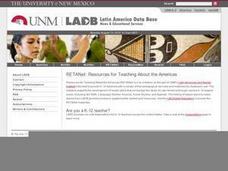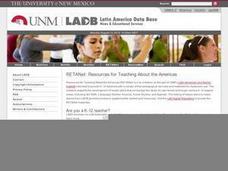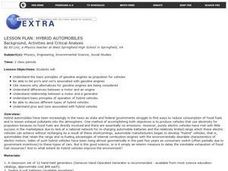Curated OER
A Broadside View of Independence
Students are introduced to and read examples of broadsides used during the American Revolution. Using the internet, they review the broadsides and decide whether or not they played a role in the struggle for independence. They report...
Curated OER
Visit My Class Wikis
Students visit the links on the blog site to learn about class wikis. In this technology integration lesson, students visit the links to view class wikis.
Curated OER
Inventing and Presenting Unit 1: Analyzing Nonfiction and Inventing Solutions
Middle schoolers read about and identify patterns in the invention process. Students discuss and write about information learned from research. Middle schoolers compile a list of problems, choose one, write a problem statement, and...
Curated OER
BOUNCING INFORMATION AROUND
Young scholars examine how satellite signals are sent and duplicate it with a mirror, flashlight and black paper.
Curated OER
Urbanization in the Amazon Basin: Can Indigenous People Survive?
Students investigate the relationship between economic development and social change of indigenous peoples.
Curated OER
American Literature: An Oblique Introduction
Eleventh graders research journals and periodicals of different accounts of Columbus and Latin America. They examine indigenous civilizations and design their own curriculum based on the information they have gathered.
Curated OER
Using Photography To Enhance A Story
Students read text and study examples of good usable photography for newspapers. They see how to crop photos for maximum effect, and to better tell the story. They tell a sports story by choosing the best and fewer photos that have the...
Curated OER
Canada's other ice show
Young scholars increase consciousness of the history of Canadian success in figure skating and appreciate the pioneers of figure skating in Canada; to examine their accomplishments in their historical context.
Curated OER
Learning Empathy Through Art
Students observe the painting, From That Day On, by Ben Shahn, and reflect on the story of the Lucky Dragon. They research and discuss the physical and emotional side effects on the Japanese people after the atomic bomb was dropped.
Curated OER
Hybrid Automobiles
Students explain the basic principles of gasoline engines as propulsion for vehicles. They cite reasons why alternatives for gasoline engines are being considered and explain differences between a motor and an engine.
Curated OER
The U.S. Recognition of the State of Israel
Students research the political aspects of the U.S. position in the Middle East, considering, for example, Truman's position in view of the 1948 presidential election. They examine a telegram sent by the Secretary of State, George C....
Curated OER
Election 2000
Young scholars review the 2000 presidential election. Students write an expository essay in response to the following: Should the election process in the United states be changed?
Curated OER
We Can Change the World!
Students use newspapers and websites to examine human rights' abuses issues. They consider how these rights' abuses relate to citizens' rights. Following their research, they write a journal entry and discuss an action or project they...
Curated OER
Comparative Stream Quality
Students examine water quality on a nearby stream. They collect water samples and test for various factors, including any contamination from the treatment plant, and present their information in a Powerpoint presentation.
Curated OER
Choosing the Best Hits
Students practice quickly scanning the results of an internet search to determine which might provide the best information. They choose key words or phrases to type into the search engine and read the descriptions of each hit.
Curated OER
"Attack A Cell, Any Cell" Disease Unit
Seventh graders use the Internet to gather information about a disease. They also discuss in groups how diseases are a worldwide problem and brainstorm ideas they can help. They create an informational packet on the disease they researched.
Curated OER
Exploring diversity: Finding ways to learn about our multi-cultural community
Students discuss ways to research our multicultural communities, set personal goals for learning about others, and outline a plan with specific goals to achieve their goals.
Curated OER
What Does Korean Literature Reveal About War?
Students are exposed to a wide variety of war related literature in order to comprehend the influence of conflict upon the lives of the Korean people. The information is used to complete a research report.
Curated OER
Sweet or Unsweet?
This lesson challenges middle schoolers to make their own judgments about the safety of artificial sweeteners after hands-on study and Internet research, and to support those judgments with carefully considered evidence and reasoning.
Curated OER
Effects Of Natural Disasters On Environment
Students investigate the concept of how natural disasters effect the environment. They conduct research using a variety of resources. They are given a scenario that needs a defensive speech. Students take a position and defend it by...
Curated OER
My Diary From Here To There: Understanding Mexican Culture Through Research and Diary Entries
Third graders explore the adventures of an immigrant as she comes to the United States. They discuss the difficulties the immigrants had and they research the Mexican culture and society. Students create a diary of their own.
Curated OER
The Great "What If" Question. How might American history have been different had Lincoln lived?
Young scholars examine the impact of the assassination of President Lincoln. After researching the Republican positions on Reconstruction and analyzing documents related to the Reconstruction, students take a position and explain their...
Curated OER
ESL: Words With "D"
In this ESL words that begin with D worksheet, students choose the correct word to fill in blanks in sentences. Page has a link to additional resources.
Curated OER
Japan, France to Develop Super-Concorde
In this ESL learning exercise, students read the given article and its presented vocabulary throughout. Students respond to 51 short answer, matching, true/false, and fill in the blank questions.






